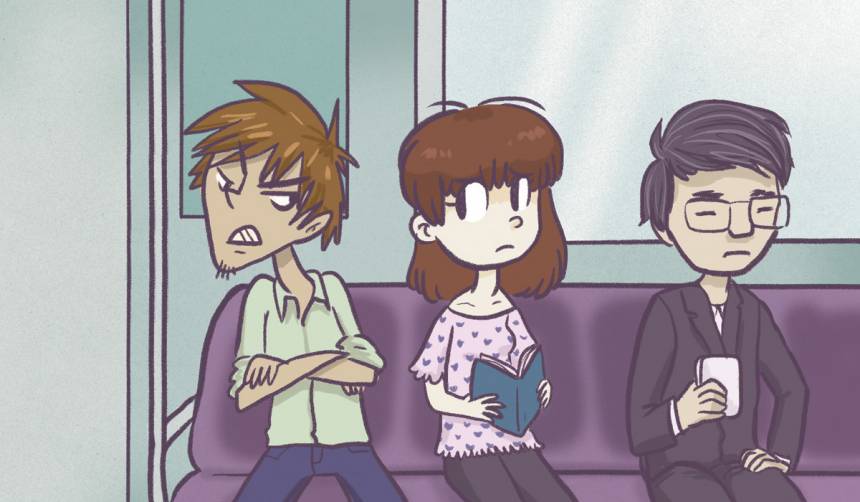
September 4, 2016
Super Commuter
On navigating horror ordeals while riding Tokyo's trains
I’m a tiny person. I don’t fill an entire train seat. So when I read on the train, my elbows hardly extend past my body’s limit. Yet on this day, I must have shifted unconsciously while engrossed in a book. The man next to me elbows me sharply in the ribs. The first time, I turn my head, thinking it was an accident but he continues to stare at his video game, scowling. After the second time I am elbowed, numerous times, I look at him in shock. Without raising his voice or even meeting eye contact, he says, “Don’t touch me” in English. I stammer out, “What? You touched me!” He gets up to exit the train, my mouth gaping in stupidity. Again, calm and without the slightest charge of emotion, he says, “I hate you.” Then he gets off the train.
I’m on the train a lot. A lot. As an employed individual, my daily commute is over two hours each way. In that time, you’re bound to see some things: salarymen slumped over in their own vomit, fights breaking out (oh, it happens), evidence of suicide, and even nudity. As amusing or disturbing as these incidences may be, I have become jaded. This is due to sheer time spent on trains as well as the invisible neon billboard floating above my head that reads “Easy target!” I am Caucasian, female, and as aforementioned, a miniature version of an actual human.
The target is expected. After living over seven years in Japan, I know that my foreign-ness will continue to turn heads, even in distracted Tokyo. Peace has been made with this notion, but as many times as someone might flag me on the street to practice English, nothing compares to the train. And it’s not just me; if you sit around with a bunch of other Tokyoites, foreign or Japanese—and especially women, they all have their own horror stories of train ordeals.
Perhaps because the train is by far Japan’s most utilized public domain, it seems to be subsequently lawless. Now, there are of course certain unstated rules that are strictly followed. You will rarely see someone talking on the phone or eating in excess, for example. I have learned during commutes to keep silent, avoid eye contact, and apologize for the slightest of mistaken nudges: “My umbrella hit your leg for a split second. My deepest apologies!” Yet despite these ubiquitous manners, the train system in Tokyo is otherwise a free-for-all. And why not? With employees rarely attending anything but the driver’s seat or platform, who’s to stop the shenanigans?
Most of my encounters are lackluster. I “enjoy” my commute in solitude, listening to podcasts or contemplating the meaning of life with the other salarymen. But then my magical gaijin instincts kick in, and I know to brace myself for another episode of “Tam on Trains.” Some episodes have been harmless: English practice, date requests, games of “Can the foreigner speak Japanese?”
Some episodes have bordered on harassment. Once, I was followed out of the train car at night by a man who wanted to be my “daddy.” Some have been downright rude, like being told to shut up when I wasn’t even talking. Finally, the most memorable episodes have been rather disgusting. I sat next to a man who picked his nose and decided to wipe it on me. Another man who gleefully read his grandpa fetish porn for my admiration. A man who masturbated in full view of every woman in the car.
I have learned that most of the time, these incidents will occur without the slightest reaction or assistance from my commuting neighbors. I also realize that this stems from cultural notions I have trouble grasping, including themes of privacy, shame, and in/out groups. And most of the time, that’s OK. I’m a “big” girl who can fend off the questionable ones, and have employed several strategies to avoid the others—and just wearing headphones doesn’t do it.
But in times when I feel rage or fear, in times when I just want to melt into the background of Tokyo, I wonder when it would be appropriate to come to someone’s aid. But until then, I have my strategies. I have my veil of patience. And above all, I have conversation starters for later.







